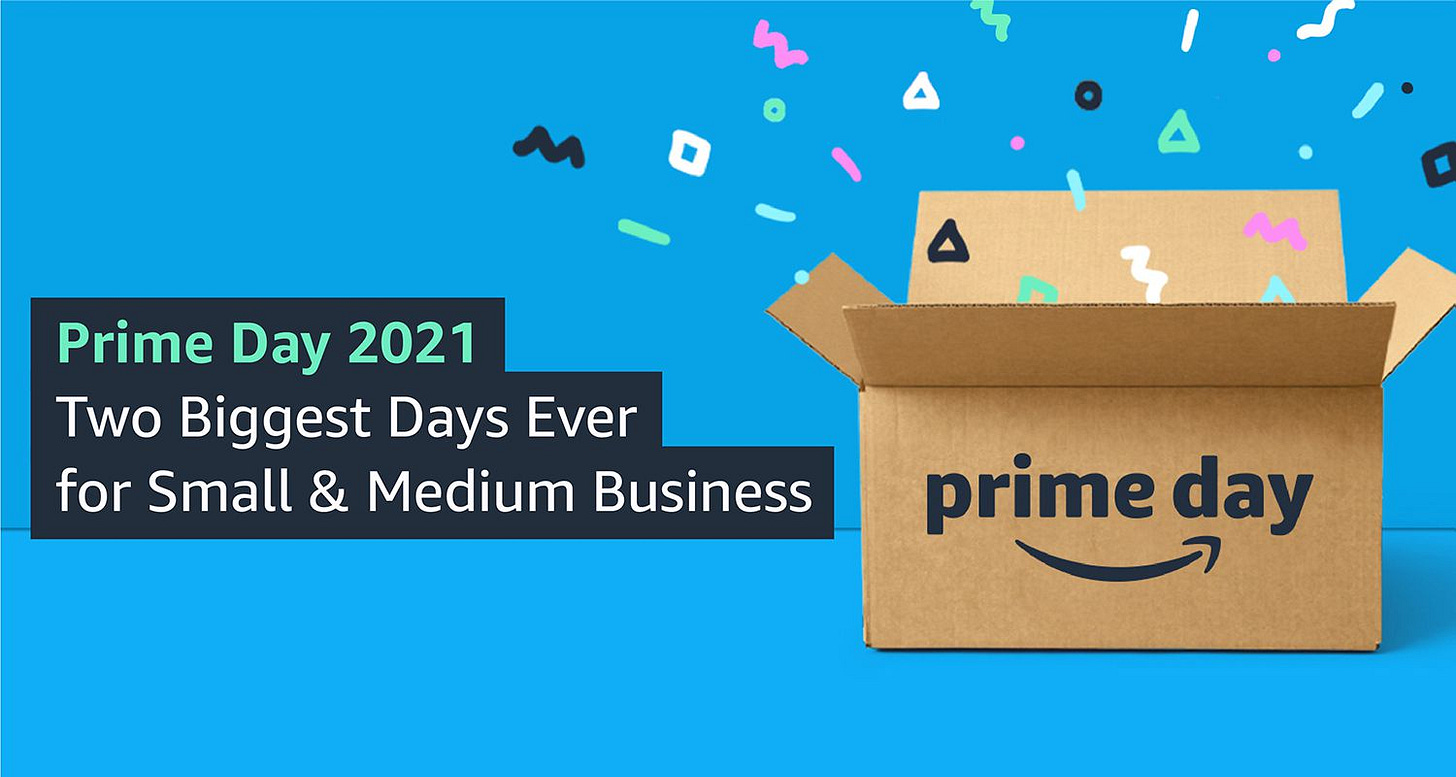👋🏾 Welcome Back! What to Expect in This Month's Newsletter
There's been a lot of SMB tech activity over the last month. We're covering a few of the biggest stories below, then diving into how brands and retailers are navigating their relationship with Amazon after a massively successful Prime Day.
We're also looking for future newsletter contributors, so please reach out with ideas!
📜 What's New With the Crew?
Sydney and Jennifer are joining Austin as Kauffman Fellows in Class 26! Read the official announcement here
Austin was featured in the Wall Street Journal discussing the changing landscape over the last year. Read more here.
📰 SMB News Roundup
American Express puts $40 million into a fund to provide loans to small business owners of color 🤑
Small business owners optimism is rebounding 🙌
Faire - a wholesale marketplace for small businesses - raises a new round at $7B valuation 🛍️
Kabbage rolls out a new banking feature - SMB checking 💳
Canapi releases their thesis on SMB banking 💭
Shopify announces plans to help 1M Black businesses grow their online presence 🔥
✍🏾Deep Diligence
This past week was Amazon’s famous Prime Day sales event where millions of customers took advantage of Black Friday-esque deals (typically for things they didn’t need, but who am I to judge?). This event, coupled with countless founders I’ve spoken to in the space, has led me to reflect on how merchants will ever be able to compete with the “Amazon-ing” of retail. Sure, SMBs had a huge Prime Day this year - but at what cost? Not only do SMBs pay Amazon a referral fee for each sale, but they also lose ownership of their customer for products that are FBA (Fulfilled by Amazon). And let’s be honest - customers are always going to choose the products that are FBA.
Given the significance of these concessions, more and more brands are trying to boost their sales on direct channels. Here are the biggest obstacles to doing so:
Visibility
Price (margins)
Convenience (availability/selection of inventory + shipping times)
Though Amazon is tough to compete with in any of these areas, we are seeing other major players step in to bridge the gap.
Shopify - arguably Amazon’s biggest competitor at the moment - has partnered with Facebook and Google to give SMB retailers the tools they need to seamlessly establish and grow their online businesses. These partnerships are crucial for solving problem #1: visibility. Though the end customer for e-commerce typically begins their product research on Amazon, Shopify brands (which are often SMB) now have the opportunity to reach customers in the places they actually spend the most time: search and social media. And, Amazon.com retailers are nixed from Google Shopping results (unless promoted by Amazon itself) because they don't own the host domain, leveling the playing field.
Obstacles #2 & #3 experience some overlap so I’ll focus on one particular partnership that’s addressing both. We know that many of the big box retailers are trying to compete with Amazon on price and convenience. However, it’s the Walmart partnership in this space that’s making the biggest impact on SMBs. Shopify merchants can now apply to be part of the Walmart marketplace where they not only gain a ton of visibility, but are also able to take advantage of Walmart’s 2-day shipping. Though quick delivery times have traditionally been price-prohibitive for smaller companies, Walmart's partnership with Deliverr grants them access to this service with negotiated prices that don't kill their margins. This is a huge win for SMBs, especially since research has proven that fast & free shipping plays a huge (positive) role in consumer choice and conversion.
Amazon has created such dominance that it’s become clear the competition will have to band together in order to compete. And with the shift in customers becoming more conscious and willing to opt-into their shopping habits, competitors to Amazon will have to offer an experience that goes beyond variety of choice + one-click checkout. SMBs have proven that they are able to capture customers through personalization - they just need the visibility and convenience offerings to do so.
What do you think? Don’t forget to hit the button below and share your thoughts.
See you next month!
Jen, Sydney & Austin






